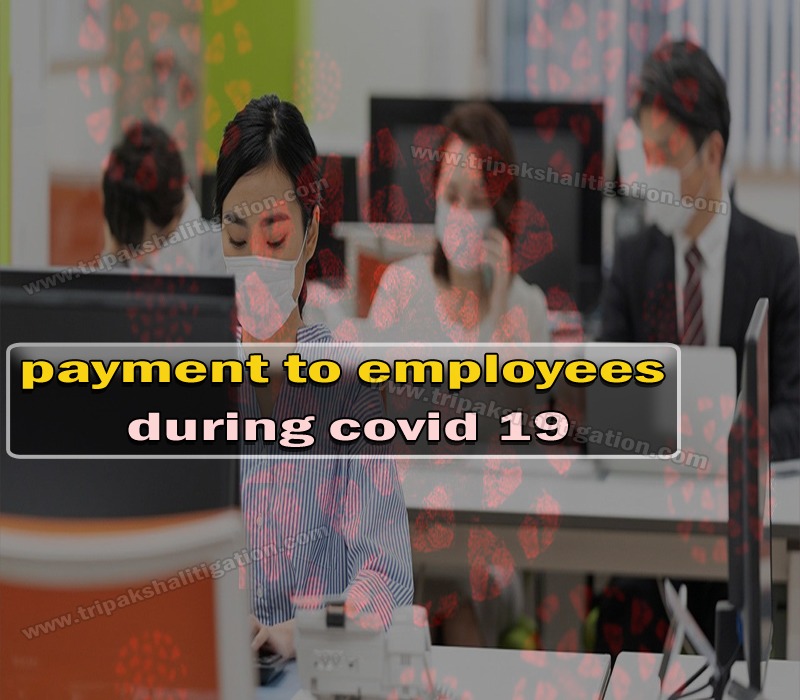The corona virus pandemic has forced the nation into a state of lockdown which is to continue in operation till 3rd May, 2020. The lockdown has disrupted the economic activities across the country in an unprecedented manner and have rendered the working population into a state where they can not go to their respective places of work as they used to under ordinary circumstances.
But what does it entail for the employers and the employees both. Whether the employers are under any compulsion to pay their employees during the lockdown of they are not reporting to their work places. To this effect the following points are highlighted:-
- On March 20, 2020 the Labour Ministry issued advisories to the employers’ associations not to terminate their employees (especially precarious workers) and reduce wages for their absences. The advisory assumes a legal dimension when it says:-
- if the workers take leave during the lockdown period they should be “deemed to be on duty without any consequential deduction in wages.
- Further if the place of employment is to be made non-operational due to COVID-19, the employees of such unit will be deemed to be on duty.
- On March 24, the Home Ministry invoked the National Disaster Management Act, 2005 (NDMA) and the Epidemic Diseases Act, 1897 (EDA) and clamped a national lockdown for 21 days from March 25 which further was extended on 14th April to continue to operate till 3rd May, 2020.
- Initially, a couple of State governments issued orders for a limited period. The governments of Telangana and Delhi in Government Orders dated March 22, invoked Epidemic Diseases Act, 1897 to issue lockdown during March 22-31, and directed that this period shall be treated as a paid holiday for all employees in the shops and establishments (for Telangana) and in all the private establishments (for Delhi).
- The government of Maharashtra has ordered (31 March) that all workers (including contract, temporary and daily-wage) in private factories and shops and establishments shall be deemed to be ‘on duty” and be paid full salary and allowances during the lockdown period.
- On March 29, the Government of India, to effectively implement the lockdown order and to mitigate the economic hardship of the migrant workers issued an order under Section 10(2)(1) of the NDMA. It directed the State governments and the Union Territories (SGs/UTs) to issue orders, compulsorily requiring all the employers in the industrial sector and shops and commercial establishments to pay wages to their workers at their workplaces on the due date without any deduction during their closure due to lockdown.
- According to Section 51(b) of the NDMA, non-compliance with the directives issued under it will be punishable with fine and/or imprisonment.
- the “no work no pay” judicial principle cannot be invoked in the present circumstances. So the employers cannot deduct wages for absences due to national lockdown.
- the government of Karnataka has allowed the employees affected by the coronavirus to avail 28 days of paid leave under the ESI Act by securing a certificate from the ESI-hospitals and those not covered under the ESI Act can avail paid sick leave and others under Section 15(3) of Karnataka Shops and Establishments Act, 1961.
- On March 30, the Ministry of Skill Development and Entrepreneurship ordered all the establishments to pay full stipend to the designated and trade apprentices engaged by them during the lockdown period.
- None of the notifications legally restrains employers from firing workers, though those industrial establishments (registered factories, mines and plantations) employing 100 or more workers need to take prior permission from the appropriate government to do so.
Conclusion
Though the “no work, no pay” principle cannot be invoked during the lockdown period by the employers and deduction of wages during the lockdown will be construed as a legal offence, but there are many questions that are left unanswered such as the wages are to be paid in full or at pro rata basis, since the National Disaster Management Act, 2005 (NDMA) does not define the ‘workers’ which definition of workers is to be taken into consideration for the said purpose. Will workers include the supervisory and managerial staff too who are generally excluded from the definition of workers under the provisions of Industrial Disputes Act, 1947.
The governmental orders have not yet been put to the test before the judiciary and the legality of such orders and the legal provisions under which they are passed are yet to be decided by the judiciary. They are beneficial step in safeguarding the interests of the employees but for the employers a chord of balance has to be struck because their business also suffered during the global pandemic and the statutory compulsions only add up to their predicament.
The judiciary has to determine the legality of the direction of various governments which are hanging upon the throats of the employers to pay in full the wages/ salaries to their employees. For the same it has to be kept in mind that the structure of business differs from one another, for instance a manufacturing sector requires a high operating cost and if they are not able to produce during the lockdown then how can they can pay the wages and salaries. A traditional business involving sale of finished goods that operates on rental premises would have to pay the mandatory fixed rents despite the lockdown but as a result their business suffers during the lockdown, the payment of salaries to employees would become difficult.
The pandemic is unprecedented in nature and everyone has get together to fight this common enemy but the checks and balances are missing in the approach of Government in regards to payment of wages to employees by their employers.
You may contact me for consultation or advice by visiting Contact Us









Is there a column on the protection of health workers ( while performing their work)frequent inquiries and litigation during the Disaster under NDMA